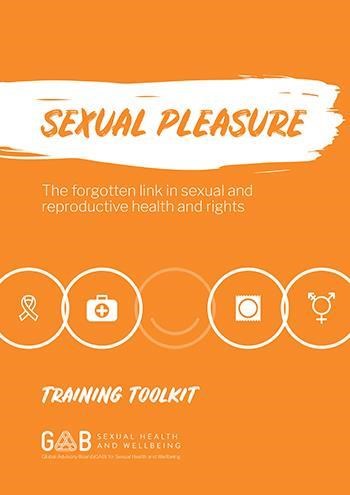SEXUAL PLEASURE: The forgotten link in sexual and reproductive health and rights (GAB, 2018)
Talking about sex and sexuality can be difficult for both sexual and reproductive health (SRH) service providers and their clients. Discussions are often limited to a problem and solution approach. Taboos around sexuality can make it difficult even for clients and providers to talk about sexual relationships, sexual wellbeing and pleasure in professional contexts. Establishing sexual pleasure as a starting point can provide a broader and positive focus on sexuality and sexual health, helping people to make informed decisions about sexual relationships and avoid risks. Talking about sexual wellbeing, sexual pleasure and sexual rights is beneficial for clients and should be commonplace in service provision.
The toolkit provides specific guidance on how SRH providers can put a sex-positive approach into practice in order to explore issues related to sexual health and sexual rights with their clients (regardless of sexual orientation or gender identity). It elaborates how to proactively incorporate information about sexual pleasure when communicating with clients; how as a provider to feel confident in answering questions; and supporting clients with autonomous decision-making regarding their sexual relationships and sexuality in general. The toolkit contains ten training modules. An innovative approach to sexual history taking is introduced using the Pleasuremeter.
Download training toolkit – PDF
Download training toolkit – Presentation slides
Introduction
In many parts of the world, talking about sex and sexuality can be difficult for both sexual and reproductive health (SRH) service providers and their clients. Usually, services and information focus on the risks of sexual behaviour and on reducing negative public
health outcomes: preventing unintended pregnancy, improving maternal health, and reducing new infections for HIV and other
sexually transmitted infections (STIs). We often fail to address the reasons why people form relationships, have sex and engage in
‘risky’ sexual behaviour in the first place – reasons such as pleasure, intimacy, reciprocity, love, closer social relationships, economic
advancement and social prestige.
Sexuality is a significant part of our clients’ lives. But a lack of open and honest communication about sex makes it hard for individuals and communities to access accurate information and support with issues related to sexuality and sexual pleasure.
The closed culture around discussing sexuality also means that it can be difficult for clients and providers to talk about sexual
relationships, sexual wellbeing and pleasure in professional contexts. It’s often easier to stick to ‘safe’ topics, such as contraception,
pregnancy choices and STI treatment options, or focus on clients’ experiences of poor health, pain or discomfort. Talking about sexual enjoyment and desire is usually taboo.
Yet talking about sexual wellbeing and sexual pleasure should be commonplace in service provision. When partners do communicate
openly and frequently about sex, condom use and contraception, research suggests that they are more able to practise safer sex and make joint decisions about sex and contraception. Studies show that young women’s acceptance of contraception was not so much based on their knowledge but much more on the nature of their relationship: whether they felt they could openly discuss expectations with their partner.2 Other studies have argued that denying the possibility of pleasure in sexual activity, particularly for
women and girls, has a negative impact on their active negotiation of safer sex.3 This is not only limited to communication between
heterosexual couples. The analysis of the relationship between open communication and safer sex/condom use applies to all
couples, including LGBTIQ couples.4 However, being open can be difficult in cultural contexts where such discussion is seen as unacceptable, where couples lack privacy and where women’s unequal position and lack of power limit open communication and joint decision-making.
